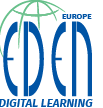
- This event has passed.
2014 Zagreb
June 17, 2014 @ 00:00
Conference Scope
European education and training systems are often criticised for not properly responding to social needs, and even that employers, education providers, and youth live in parallel universes. Universities? reputation often comes from the visible, high level relations with prestigious corporations. E-learning, as a system integrator, may help education providers and employers to actively step into one another?s worlds.
Workplace-based training supported by ICT tools is part of the solution to reduce skill shortages and mismatches. E-learning has become a dominant delivery method in learning settings at work across various sectors and a wide range of company sizes. Its advantages may be many, including flexibility, cost and time savings, and new work habits and improved working climate. ICT-enhanced learning may improve organisational performance and lead to increased staff commitment and the generation of new ideas. E-learning is often used by companies to inform and educate not only their employees but also customers, as part of their branding and marketing strategy and activities.
The latest ICT solutions for simulations, virtual worlds, immersive learning and enhanced learning experiences are continuously producing renewed toolkits, supporting the development of authentic learning settings. E-competences and e-skills are increasingly treated as autonomous elements of personal development to be supported by specific learning activities and patterns.
The year 2014 is important as the start of the new European programme period until 2020. This coincides with intensive developments in ICT-supported learning, educational innovations and, in particular, open educational resources. With present economic trends, the key question being growth and employability, it is highly important how employers accept job candidates with the certifications and competences from the new world of learning, characterised by many innovative approaches and open educational settings.
New challenges, new formats: the Synergy Strand
EDEN introduced a new strand to its well established paper presentation, workshop, demonstration and poster strand. This year, the Synergy Strand facilitated the sharing of project outputs and research findings, offering the participants platform to develop new ideas and plans, to create new partnerships by engaging the conference audience in highly interactive working group activities during parallel sessions.
EU projects and practices ? that display thematic cross sections with the Conference Themes ? were invited to introduce themselves during the conference’s Synergy Strand. The list of the short introductions of these initiatives is available here and will also be published in the Creative Commons licensed Book of Projects. This page serves both as a dissemination vehicle for the showcased projects, as well as a collection of resources to help the participants to prepare for the collaboration activities carried out during the conference dates.
See what happened at the Synergy sessions here
